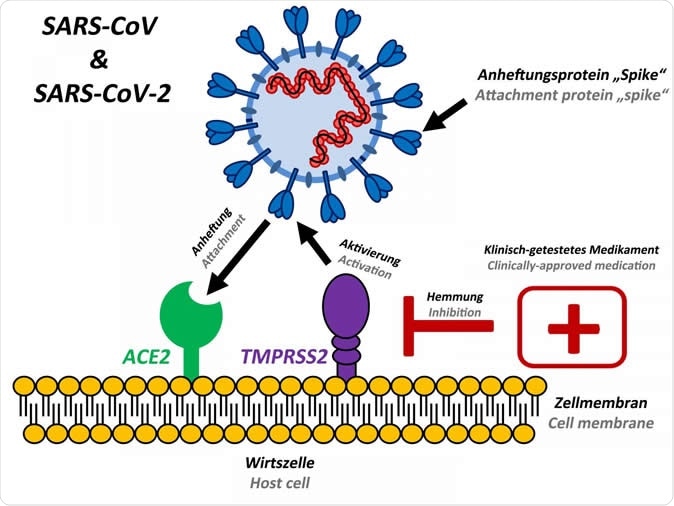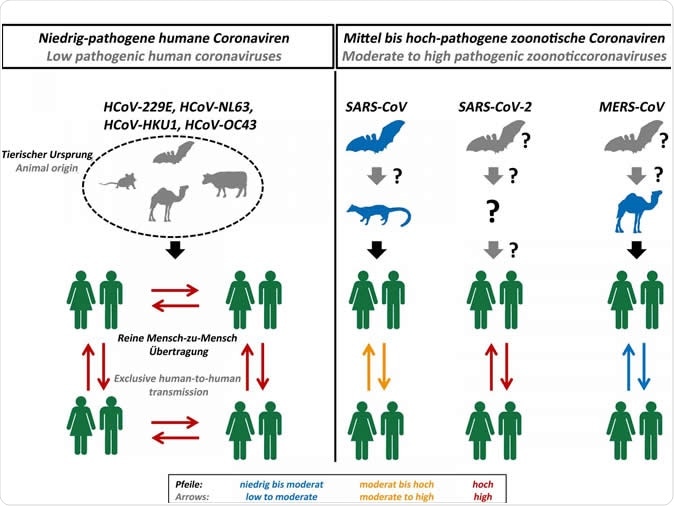Just like any other virus, the coronavirus needs a host to survive. Viruses enter the cells of the human body to cause disease by attaching to a specific receptor site on the host cell membrane. To do this, they attach to proteins in the capsid through glycoproteins found in the envelope of the virus.
Now, infection biologists form the German Primate Center - Leibniz Institute for Primate Research in Göttingen, together with colleagues at Charité – Universitätsmedizin Berlin, have found how the novel coronavirus SARS-CoV-2 penetrates the cells.
The virus
Many coronaviruses circulate globally and continually infect humans, which is typically manifested as mild respiratory disease. However, over the past decade, several coronaviruses have posed a serious health threat to many populations, including the severe acute respiratory syndrome (SARS) virus, and the Middle East Respiratory Syndrome coronavirus (MERS-CoV).
.jpg)
Novel Coronavirus SARS-CoV-2: This scanning electron microscope image shows SARS-CoV-2 (round gold objects) emerging from the surface of cells cultured in the lab. SARS-CoV-2, also known as 2019-nCoV, is the virus that causes COVID-19. The virus shown was isolated from a patient in the U.S. Credit: NIAID-RML
Currently, the world is witnessing the spread of a novel coronavirus that has infected nearly 110,000 people and caused the death of more than 3,800 people, mostly in mainland China. The new virus has been officially named the sudden acute respiratory syndrome coronavirus type 2 (SARS-CoV-2) and is known to be transmitted from wild animals to humans.
The coronavirus disease (COVID-19) started to spread in late December 2019 at a seafood market in Wuhan City, Hubei Province, China, and has infected tens of thousands of people across 102 countries. At present, there is no vaccine or treatment available to curb the disease, which is closely related to the SARS epidemic that occurred between 2002 and 2003.

The attachment protein "spike" of the new coronavirus SARS-CoV-2 uses the same cellular attachment factor (ACE2) as SARS-CoV and uses the cellular protease TMPRSS2 for its activation. Existing, clinically approved drugs directed against TMPRSS2 inhibit SARS-CoV-2 infection of lung cells. Image Credit: Markus Hoffmann
Stopping the virus spread
The team of scientists may have found a way to prevent the spread of the dreaded coronavirus. The entry of coronaviruses into cells depends on the binding of the viral spike proteins to cellular receptors and protein priming by host cell proteases. The team wanted to unveil the cellular factors that are used by SARS-CoV-2 for entry may shed light on the viral transmission and pave the way for the discovery of potential therapeutic targets.

Origin and transmission of pathogenic coronaviruses. Image Credit: Markus Hoffmann
The team identified a cellular protein called TMPRSS2, which is crucial for the entry of the novel coronavirus into lung cells. The results of the study show that the virus needs the protease, which is present in the body, to enter the cells, providing a new target for therapeutics.
“Our results reveal important commonalities between SARS-CoV-2 and SARS-CoV infection and identify a potential target for antiviral intervention,” the researchers wrote in the paper.
Preventing spread of SARS coronavirus-2 in humans
Potential treatments for COVID-19
A known drug called camostat mesilate works by inhibiting the protease TMPRSS2, the team has studied if it can also prevent the infection with SARS-CoV-2. The team tested the virus from a patient and discovered that the drug is effective in blocking the entry of the virus into lung cells.
Camostat mesilate is a drug approved in Japan for pancreatic inflammation. Now, the drug shows promise as a potential treatment for patients with the infection or as a protective agent against COVID-19. However, the drug still needs to be tested in clinical trials before it can be used on patients.
The extent of the coronavirus infection
The coronavirus disease outbreak has already infected tens of thousands across the globe. The common signs and symptoms of the virus include cough, high fever, and shortness of breath. The virus causes lung inflammation and pneumonia-like illness, and in the long run, can lead to acute respiratory disease, which can be life-threatening.
The disease has been seen mostly in older people, though young adults can be infected too. The severity of the disease increases as a person grows older; hence, seniors are most likely to experience more severe symptoms.